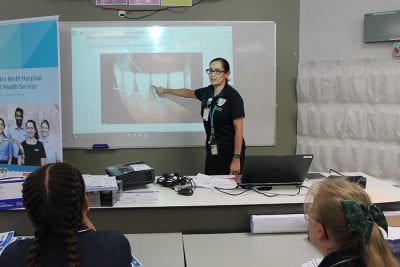New peer support model breaks down barriers
An innovative new health trial has improved dental care outcomes for students entering high school in Pine Rivers.
The Smarter Smiles program which was piloted at the Dakabin State High School (SHS) over the past two years has improved access to Metro North Oral Health Services for adolescents at higher risk of dental decay.

A unique new program is helping to reduce the impact of tooth decay for Pine Rivers teens entering high school.
Community and Oral Health Consultant Oral Health Therapist Alison Dickinson said the program aimed to improve access to dental care and oral health education for at-risk adolescents who are entering high school and transitioning from paediatric dental care.
“Typically, at this age you see less teens accessing dental care,” she said. “Protective factors like good oral hygiene drop off, and risk factors such as poor dietary choices and soft-drink consumption tend to increase at this life-stage.
“The percentage of 12-year-old children residing in Metro North with decay in their permanent teeth is more than 40 per cent, and seven per cent have decay that is considered severe.
“With less than 70 per cent of Australian children brushing their teeth twice a day, there is a need for oral health programs to support students as they become more self-reliant in maintaining good oral health.”
The Smarter Smiles program trialled on-site oral health screening at Dakabin State High School, preventive dental fluoride varnish treatment and supplementary oral health education.
“A referral pathway was established with our local school-based dental clinic where we could refer students identified as requiring comprehensive dental care or further complex procedures,” Ms Dickinson said.
“This designated “dental home” is somewhere students can now rely on to access free, high quality dental care.
“We anticipate that the trial at the high school is the first step in developing and delivering a program that could be rolled out more broadly across Metro North high schools and perhaps even across the state.”
A soft pilot trial was previously conducted at Dakabin State High School in 2019 which saw 32 per cent of Year 7 students consenting to the program with about 20 per cent receiving preventive treatment.
Ms Dickinson said in 2020 there was a significant increase in student participation with 72 per cent of Year 7 students consenting to the program and 56 per cent of students receiving preventive treatment.
Smarter Smiles was funded by Metro North SEED (Support, Explore, Excel, Deliver) Innovation program.
QUALITY OF CARE
TABLE OF CONTENTS
